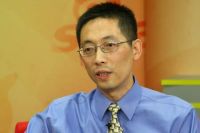Shi Yigong
Shi Yigong (施一公) is a world renown structural biologist, who is now working as a professor at Tsinghua University.
Born in a family of scholars in Henan Province, in May 1967, Shi was recognized as one of the youngest professors in the Department of Molecular Biology at Princeton University in 2003. His research on cell death and molecular carcinogenic rate gave him a moderately wealthy lifestyle in the United States, where he had been studying since 1990. However, in 2008, Shi decided to resign from the enviable position and returned to Tsinghua to start from scratch. His decision, almost made overnight, astonished other professors, who told Shi that he was making a huge mistake.
Shi eventually returned to Tsinghua, where he had received his bachelor degree from the Biological Sciences and Technology Department in 1989. Nineteen years had passed and when he stepped into his alma mater’s landmark school gate, he was no longer an exuberant graduate who dreamed of a life overseas. After toiling for years in the United States, where he used to wash dishes at his part-time job and where he was nearly killed by robbers, Shi was expected to build up Department of Biological Sciences at Tsinghua.
“I return to educate people, to educate generations after generations not only by minds but also by hearts,” Shi said.
“Young people today are generally lacking dreams, which would push them to persist no matter what happens. But if being guided correctly, some students of Tsinghua can be transformed, to dream beyond their own losses and gains. And I would be rather satisfied [to see them growing up] when I’m retired 20 or 30 years later.”
Shi has done as remarkably at Tsinghua as he did at Princeton. And Shi’s American counterparts did not forget about him, who published numerous papers in well-known magazines, such as, ”Cell”, “Nature” and “Science”. In 2010, he was awarded with the Raymond and Beverly Sackler International Prize in biophysics. In 2013, he was elected as a member of the American Academy of Arts and Sciences. He was also a candidate for the Chinese Academy of Sciences in the same year, but failed to become a member.
